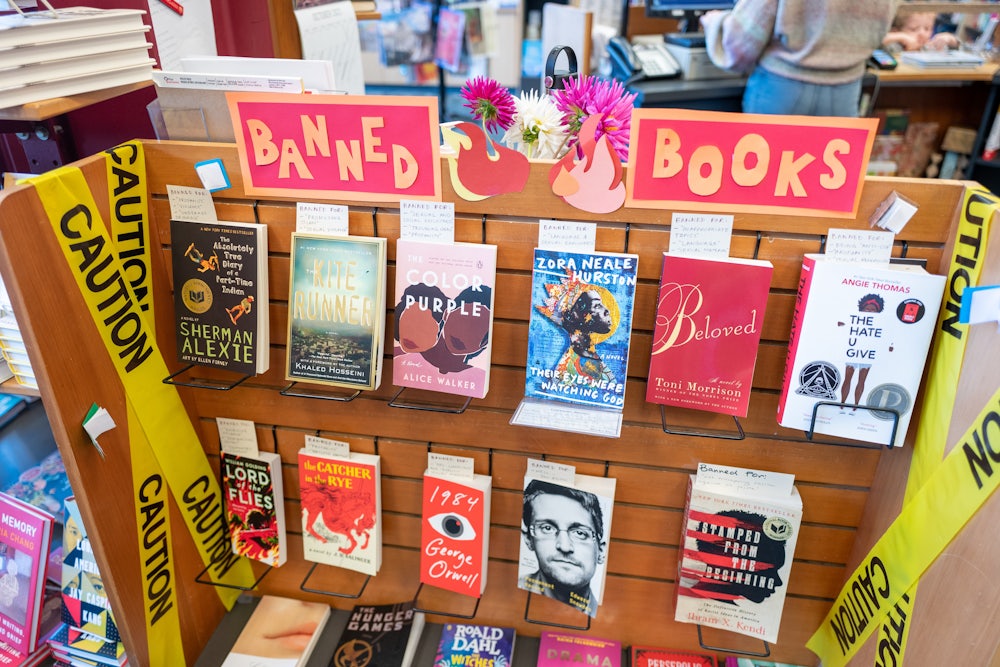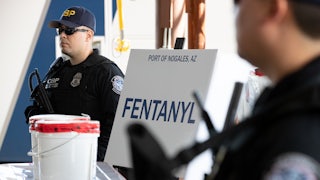Most of the books banned in schools in the United States in the last year featured LGBTQ+ characters or characters of color, or both. And half of voters oppose all such bans in schools and public libraries. Both of those findings come from two reports released Monday, which marked the beginning of Banned Books Week.
PEN America, which tracks threats to free expression faced by authors, has identified 1,648 unique books that were banned across 138 school districts in 32 states between July 2021 and June 2022. Of these, 41 percent had “LGBTQ+ themes, protagonists, or prominent secondary characters,” and 40 percent included “protagonists or prominent secondary characters of color,” and PEN noted that “many titles contain more than one type of content.” They found that fiction and young adult books are more likely to be banned, though picture books made up nearly 20 percent of books banned. All told, works by more than 1,200 authors were banned, affecting nearly four million students.
The EveryLibrary Institute, a nonprofit supporting libraries and public education, also released research this week examining voter attitudes on book bans. Based on a survey of 1,223 registered voters between August 31 and September 3, it found that half of voters opposed all book bans, and three-quarters would consider book banning when casting their vote in November. More of those surveyed felt “very favorably” toward school librarians (41 percent) than toward the Democratic Party (14 percent) or the Republican Party (13 percent). Nearly all had heard something about book bans, with 56 percent saying they had “heard a great deal.” Fifty-nine percent opposed bans on books related to sexuality, and 72 percent opposed bans on books related to race.
Pushing these bans, it appears from PEN’s research, are at least 50 different groups, with eight groups having at least 300 local and national chapters between them, and with 38 others appearing not to have such affiliations. Most of the groups are new, seemingly having been founded only in 2021. They share tactics too, some of which may be familiar, such as “swarming school board meetings” and “using inflammatory language about ‘grooming’ and ‘pornography.’” Some promote Christian nationalism.
One of those groups, Moms for Liberty, boasts more than 200 chapters and 95,000 members. In July, 500 members met in Tampa for their first national summit, at which former Education Secretary Betsy DeVos called for the Department of Education to be abolished and Florida Governor Ron DeSantis was honored with a wooden “liberty sword” in recognition of his fight for “parents’ rights.” But “likely the real point of the gathering,” reported Kathryn Joyce at Salon, was the nine strategy sessions held behind closed doors on topics like “gender ideology” (by which they mean the existence of trans people) and “school choice” (meaning eroding public education).
The aim of such groups often goes beyond book bans. A recently elected district attorney in Tennessee said she has brought Moms for Liberty to meet with the county sheriff and said there may be cases where prosecuting educators and librarians would be warranted. A member in a Moms for Liberty Florida chapter has recently advocated for separate classes for LGBTQ students. The monthly meeting of a Texas chapter hosted the self-described Christian fascist activist Kelly Neidert, who has organized demonstrations meant to terrorize LGBTQ communities in the state.
These book bans are not merely efforts at censorship. They have been a vehicle for boosting the electoral campaigns of candidates sharing these organizations’ views, along with denying the result of the 2020 presidential election and preparing to contest future elections. And these campaigns are part of a national effort to mobilize harassment and threats of violence, directed not only at schools but at libraries, bakeries, and bars—any community space open to people, not coincidentally, whose stories these campaigners seek to erase.


